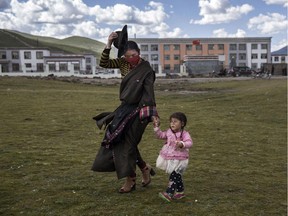Peter McKenna: Climate change is a human-rights issue

Article content
Much of the discussion about human-causing climate change revolves around mostly economic and environmental considerations. It’s now time to broaden the net to include human rights concerns.
As the UN Conference on Climate Change slated for late November in Paris approaches, we should not lose sight of the fact that climate change has a huge impact on human beings. Indeed, the effects of climate change inflict considerable pain and suffering on peoples throughout the planet — and especially on those living in the global South.
Accordingly, we are now starting to see the language of human rights being situated at the centre of climate change debates and of any future global climate change regime. But there have been very few attempts thus far to apply an international human rights framework to address the negative impacts from anthropogenic climate change. That needs to change.
We should be thinking about climate change in terms of human rights violations and to begin incorporating those concerns into how the world is planning to confront future challenges from a changing climate. Both mitigation and adaptation strategies are going to have profound human rights implications for millions of people. But in the short term, Canadians need to recognize that contributing to the rise in carbon emissions is violating people’s human rights in other parts of the world.
Resolutions and documents at the United Nations have been making the link between climate change and human rights since the early 2000s. And the invocation of these human rights stems from the Universal Declaration of Human Rights, the International Covenant on Civil and Political Rights and the International Covenant on Economic, Social and Cultural Rights. It is also important to note that those countries, including Canada, which are signatories to these documents take on certain responsibilities and obligations.
When we talk about the human rights of climate change, what we generally mean are rights such as the right to life, the right to health, the right to adequate food and the right to water. One could also include the rights to housing/shelter, security of the person, education and even freedom of speech (for those who advocate for environmental protections). Climate change, without a doubt, puts each of these basic rights in jeopardy.
There is also the thorny issue of population movements or citizens (including children) who have no choice but to flee their homes in order to escape environmental destruction. We should start calling them climate migrants — especially as their numbers continue to sky-rocket. Some estimates put the number of migrants who will be seeking refuge from climate degradation at over 100 million by 2050.
We know that the impacts of runaway climate change are wide-ranging: rising sea levels, higher temperatures, melting polar caps, and extreme weather events. These all directly and negatively affect millions of people through drought, forest fires, flooding, desertification, natural disasters and infectious diseases. As a result, these impacts will have serious human rights implications for those living on small island states, many in the poverty-stricken developing world, and indigenous peoples.
In a ground-breaking legal case in late 2005, the Inuit Circumpolar Conference, chaired by Canada’s own Sheila Watt-Cloutier, initiated a petition against the U.S. government for violating the human rights of the Inuit people by failing to implement an effective greenhouse gas reduction plan. While the Inter-American Commission on Human Rights eventually declined to consider the petition, it was the first case to specifically link human rights with climate change. This, of course, raises the future probability of litigants going to courts to seek — as in other human rights cases — redress for harm inflicted on them by climate change.
So perhaps it’s time to reframe the debate around climate change and human beings. By adopting a human rights approach, it would give the issue added weight and a “human face,” subject the conduct of national governments to greater international scrutiny and legal pressures, and emphasize the urgency of resolving the problem immediately.
Peter McKenna is professor and chair of political science at the University of Prince Edward Island in Charlottetown.






Postmedia is committed to maintaining a lively but civil forum for discussion. Please keep comments relevant and respectful. Comments may take up to an hour to appear on the site. You will receive an email if there is a reply to your comment, an update to a thread you follow or if a user you follow comments. Visit our Community Guidelines for more information.